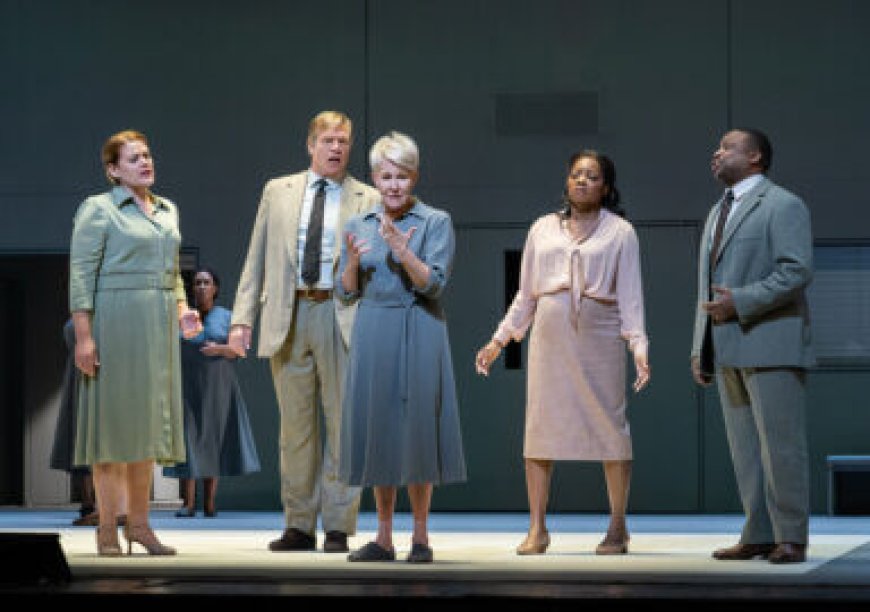Opera and song interrogates institutional confinement in New York and Toronto
The Metropolitan Opera opened its season with its first-ever staging of gay composer Jake Heggie and gay librettist Terrence McNally’s “Dead Man Walking” (2000), the most produced opera of the last quarter century. Staged by gay director Ivo van Howe with sets by his longtime partner Jan Versweyveld and conducted by out music director Yannick … Read More

The Metropolitan Opera opened its season with its first-ever staging of gay composer Jake Heggie and gay librettist Terrence McNally’s “Dead Man Walking” (2000), the most produced opera of the last quarter century.
Staged by gay director Ivo van Howe with sets by his longtime partner Jan Versweyveld and conducted by out music director Yannick Nézet-Séguin, the October 3 performance was gripping. The three principal singers (Joyce DiDonato, Ryan McKinny, and Susan Graham, as crusading nun Sister Helen Prejean, condemned prisoner Patrick DeRocher, and his mother) have done their parts before and have both the psychological measure of their difficult roles and the stage skills to express them. Von Hove’s design team achieved some very striking effects in stylized realism — the prison setting evoked more by space and Jan Versweyveld’s superbly calibrated lighting than by bars or cages. The videography could prove too insistent and intrusive, but as filmed for HD showing on October 21, it will provide effective close-ups.
“Dead Man Walking” is a highly impactful music theater. McNally’s work shows his familiar strengths and weaknesses as a boulevard playwright: With straightforward structure (though some scenes run too long) and an ear for natural speech, his eye for socially important themes weakened here and there by tension-diffusing comic one-liners. Though Heggie excels at song composition in the tradition of Samuel Barber, this first opera doesn’t offer idiolects for individual characters that differentiate them in purely musical terms. His music here (compared with 2010’s more ambitious and sophisticated “Moby Dick”) is skillfully eclectic but rather conventional. Still, it packs a punch. “Dialogues des Carmélites” and “Billy Budd” figure among the score’s evident inspirations, with flowing ariosos punctuated by occasional set pieces or choral episodes. Nézet-Séguin attained clarity and flow, only occasionally allowing the orchestra to grow too boisterous.
DiDonato’s upper register lacks the expansion it had two decades ago in the very highest passages, but she turned every single moment of the score and text to her advantage in channeling the pluck and goodness of a committed humanist. Her dynamic control and expressive commitment are things of wonder. The bass-baritone of chameleonic actor McKinny has grayed just a bit, but his terrifying and terrified DeRocher was a complete portrait to match DiDonato’s in intensity. Graham — who originated Sister Helen in 2000 — returned to the Met with a deeply moving, vanity-free portrayal. Rod Gilfry was on fire as a victim’s anguished father. Latonia Moore made lovely sounds in her generous embodiment of Sister Helen’s colleague and confidante. Raymond Aceto, Chad Shelton, and star-on-the-rise Justin Austin excelled in cameo roles. The choral work was superb. Highly recommended.
Nézet-Séguin also led a Verdi “Requiem” (September 29) that betrayed less rehearsal time than last year’s fine showing, and bottom-challenged bass Dmitry Belosselskiy sounded provincial. But luxuriant mezzo Karen Cargill rocked, and thrilling-voiced soprano Leah Hawkins steadily improved, acing the crucial “Libera me” section. Ever musicianly but slightly undergunned, Matthew Polenzani scored in a heartfelt “Hostias.”
The Canadian Opera Company’s October 1 “Fidelio,” bracingly led by Johannes Debus, utilized gay director Matthew Ozawa’s insightful contemporary staging to evoke the corrupt, abusive prison system of an unspecified current (nominal) republic. Alexander Nichols’ industrial set — beautifully lit by Yuki Nakase Lin — rotated too often but proved as impressive as his projections. Ozawa tweaked the text (“President” replaced “King”) and cast doubt on Beethoven’s radiantly happy ending — the liberating visit of Don Fernando (Juilliard-trained Sava Vemić, terrifically charismatic in voice and presence) evoked a smarmy politico’s photo op.
Finnish dramatic soprano Miina-Liisa Värelä showed a powerful, if sometimes less than dulcet, voice as a moving Leonore: a useful artist. In San Francisco, Ozawa cast a Black Florestan (Russell Thomas), which — as Heartbeat Opera’s NYC staging showed— adds a powerful dimension to this story of punitive illegal imprisonment. But Clay Hilley did a fine job with the testing role here confirming his Wagnerian promise before an audience familiar with Jon Vickers in this signature role. Other than some hammy cackles, Johannes Martin Kränzle acted and sang Pizarro brilliantly, and the others — Dimitry Ivashchenko (Rocco), Anna-Sophie Neher (Marzelline) and Josh Lovell (Jaquino) — all furnished well-sung and vividly imagined portrayals. And here, too, the chorus deserved their cheers.
A different institutional setting — that of an army hospital — filled the Park Avenue Armory in Claus Guth’s performance piece “Doppelganger,” a rare local appearance by superstar tenor Jonas Kaufmann with his excellent longtime pianist Helmut Deutsch. The musical substance was a re-ordered, electronic music-augmented version of “Schwanengesang,” the last songs penned by gay composer Franz Schubert as posthumously assembled by his brother and publisher. Here we began with “Kriegers Ahnung” (“The Soldier’s Foreboding”), framing a visually stunning implicit narrative of a dying soldier’s last experiences, memories, and dreams. A large contingent of actors mimed the attendant nurses and fellow sufferers, to (usually) apt movement direction by Sommer Ulrickson: a unique experience. Heard through considerable, if unevenly applied, amplification, Kaufmann, 54, did some crooning and avoided Schubert’s (written) signature triplets, but in general sounded very healthy in music he phrases with authority and point (unlike the truly lamentable crossover albums he’s lately dropped). He sounds like he could still shine at the Met as Florestan, Parsifal, and — please! — Peter Grimes.

 Mark
Mark 





